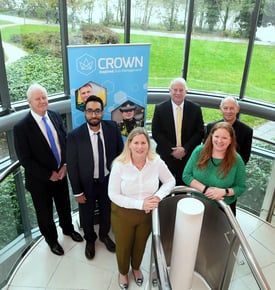Crown Workforce Management’s Managing Director, Mike Hawkesford, argues that Cloud technology is more secure and efficient than on-premise and hosted servers.
Converting police workforce data into meaningful information to enhance police services’ operational efficiency can be improved significantly with migration to the Cloud. I believe Cloud technology is more secure and efficient than on-premise and hosted servers.
With more than 20,000 police officers recently recruited and the need to make savings wherever possible, a perfect storm has been created for police services to explore ways to use their workforce as effectively as possible.
Using Data to Deliver Tangible Benefits
It was a huge pleasure hosting Crown  Workforce Management’s annual Blue Light User Group (BLUG) Conference, when senior managers and workforce planners joined us from 15 of England’s police forces – all of whom are our clients – and there was a real appetite in the room to explore ways of using the wealth of time & resource data accumulated within the Duty Management System (DMS), to improve strategic thinking and management of the workforce. As well as being an essential resource planning facility, DMS keeps detailed records of historical resource plans, corresponding attendance records, and all overtime, absence, sickness and other abstractions. Commonly available Business Intelligence (BI) tools like Microsoft Power BI can then be used for high-volume data analysis and visualising management information.
Workforce Management’s annual Blue Light User Group (BLUG) Conference, when senior managers and workforce planners joined us from 15 of England’s police forces – all of whom are our clients – and there was a real appetite in the room to explore ways of using the wealth of time & resource data accumulated within the Duty Management System (DMS), to improve strategic thinking and management of the workforce. As well as being an essential resource planning facility, DMS keeps detailed records of historical resource plans, corresponding attendance records, and all overtime, absence, sickness and other abstractions. Commonly available Business Intelligence (BI) tools like Microsoft Power BI can then be used for high-volume data analysis and visualising management information.
Real-life examples could include utilising BI software to quickly spot real time trends of strength and weakness – for example, is one operational department particularly low on taser trained personnel or spotting if a colleague has an unusually high absence rate that triggers a particular internal process.
Crown’s solution uses MS Azure facilities that enhance the capability of BI tools by exposing the DMS database schemas without adversely affecting data security and operational performance.
Business intelligence can, of course, be tailored to each police service’s requirements. The ease with which meaningful management information is made available is one reason Crown’s DMS Cloud solution is being adopted in increasing numbers.
Why is this significant?
As data usage potential and remote working increase, so does a data set’s vulnerability to exposure; therefore, adopting new business intelligence processes should go hand-in-hand with a Cloud-based platform.
The Security of the Cloud is Key
Our Cloud installations include protective technologies and monitoring and are constantly thwarting thousands of attack attempts around the clock by hackers and bots highlighting how vulnerable an organisation’s physical servers would be if they were exposed to the internet. This is an important point, because we can see that many police services – and other public sector organisations – are now adopting a ‘Cloud-First’ policy, migrating from physical, On-Premise solutions to Cloud-Based services, to reduce costs and improve their operational efficiency.
But there are many more reasons why Cloud services are now the solutions of choice. They provide high availability, with evergreen technology that is scalable and, from a customer
perspective, requires no periodic investment in hardware and costly technical skills. Cloud service providers, such as Crown, handle all the complicated technical stuff, leaving our
clients to get on with their core business without diverting their time and money into non-core activities. Ideally, all police forces need a uniform online system to share data efficiently
and securely – an issue that will more than likely come to the fore when a police force needs to pool resources for large-scale events – an approach that will likely become essential over time.
Colleague welfare Mental health, perhaps, isn’t a topic one would instinctively associate with the analysis of data. Still, an impactful talk from Steve Philips from The Jordan Legacy at our BLUG Conference highlighted just how important it is for police forces and their resource planners to consider the mental health of police officers when reviewing their processes.
Steve founded the suicide prevention charity,  The Jordan Legacy, after his son Jordan took his own life in 2019, and urged the audience to think about ways they could adopt an empathetic approach to their working lives. A surprising statistic - whereas most people experience maybe four or five traumatic experiences in their lives, police officers will typically encounter up to 800 traumatic events throughout their career, so it was insightful and powerful to have Steve at the conference to highlight the importance of reviewing systems and processes to improve officers’ mental health.
The Jordan Legacy, after his son Jordan took his own life in 2019, and urged the audience to think about ways they could adopt an empathetic approach to their working lives. A surprising statistic - whereas most people experience maybe four or five traumatic experiences in their lives, police officers will typically encounter up to 800 traumatic events throughout their career, so it was insightful and powerful to have Steve at the conference to highlight the importance of reviewing systems and processes to improve officers’ mental health.
A key takeaway for me and our resource planner colleagues was a suggestion that they should build in a safety plan for each staff member, and put greater emphasis on the early identification of potential actions following exposure to high-pressure and traumatic events, large or small.